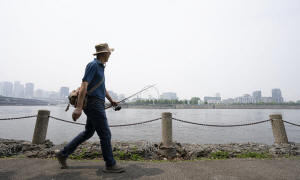Wildfires force another 1,000 residents from their homes in the Canadian
province of Manitoba
[June 07, 2025]
WINNIPEG, Manitoba (AP) — Wildfires forced another 1,000 people to flee
their homes in Manitoba, one of two Canadian provinces under a state of
emergency that has led to thousands of evacuations.
Smoke from Canadian wildfires has worsened air quality in eastern Canada
and the U.S. The fires have forced thousands of Canadians to flee their
homes and sent smoke as far as Europe.
The town of Snow Lake, Manitoba issued a mandatory evacuation order for
its residents Friday as a large wildfire threatens the area.
That fire, which has now grown to more than 3,000 square kilometers
(1,058 square miles), has already forced out all 5,000 residents of the
city of nearby Flin Flon and a thousand more in surrounding cottages and
homes.
When the Snow Lake evacuees are added in, Manitoba has about 19,000
displaced from their homes. There are 27 total fires in the province of
Manitoba, eight of them out of control.
Manitoba Premier Wab Kinew said evacuees have found a place to stay with
friends or family, in hotels or in congregate shelters.
Saskatchewan Premier Scott Moe, premier of the neighboring province,
said two people were charged with setting wildfires. He said one of them
was charged in relation to a fire around La Ronge, Saskatchewan, which
has forced 7,000 people to flee their homes.

[to top of second column]
|

A man walks along the St. Lawrence River in front of the Old Port of
Montreal on Friday, June 6, 2025. Smoke from the wildfires in the
Canadian Prairies is causing poor air quality and reduced visibility
in the Greater Montreal region. (Christinne Muschi /The Canadian
Press via AP)

There are 24 active wildfires burning in the province of
Saskatchewan, forcing between 10,000 and 15,000 people from their
homes.
“Many if not virtually all of the fires that we’re dealing with in
Saskatchewan, although not intentionally, are human caused. Some of
those have been intentionally human caused,” Moe said.
The province is also under a state of emergency, making it easier
for different levels of government to coordinate a response.
Moe said they are in daily contact with the federal government but
have not yet asked for the military to help airlift out evacuees as
they have so far been able to get them out by road.
He said the Red Cross is also working to set up congregate shelters
for evacuees in Regina, Saskatoon and Prince Albert.
Canada’s wildfire season runs from May through September. Its
worst-ever wildfire season was in 2023. It choked much of North
America with dangerous smoke for months.
All contents © copyright 2025 Associated Press. All rights reserved |